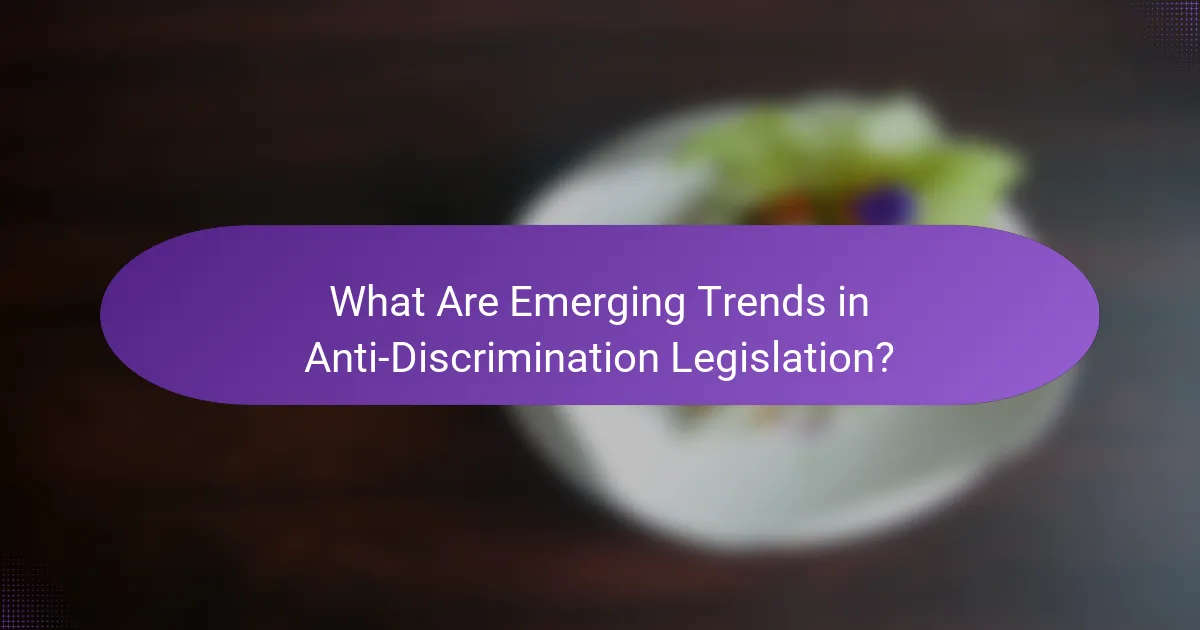Anti-discrimination laws in the USA are designed to protect individuals from unfair treatment based on characteristics such as race, gender, age, and disability, ensuring equal opportunities in employment, housing, and education. Enforced by various federal, state, and local agencies, these laws not only hold violators accountable but also promote a fairer workplace and enhance overall company image, leading to increased productivity and employee satisfaction.

What Are the Key Anti-Discrimination Laws in the USA?
The key anti-discrimination laws in the USA aim to protect individuals from unfair treatment based on specific characteristics such as race, gender, age, and disability. These laws provide a framework for ensuring equal opportunities in various areas, including employment, housing, and education.
Civil Rights Act
The Civil Rights Act of 1964 is a landmark piece of legislation that prohibits discrimination based on race, color, religion, sex, or national origin. It applies to various sectors, including employment, public accommodations, and federally funded programs.
Employers with 15 or more employees must comply with this law, which allows individuals to file complaints with the Equal Employment Opportunity Commission (EEOC) if they believe they have been discriminated against. Remedies can include reinstatement, back pay, and damages.
Americans with Disabilities Act
The Americans with Disabilities Act (ADA) of 1990 prohibits discrimination against individuals with disabilities in all areas of public life, including jobs, schools, transportation, and all public and private places open to the general public. The ADA requires employers to provide reasonable accommodations to qualified employees with disabilities.
Employers with 15 or more employees must adhere to the ADA, which emphasizes accessibility and equal opportunity. Examples of reasonable accommodations include modifying work schedules or providing assistive technology.
Age Discrimination in Employment Act
The Age Discrimination in Employment Act (ADEA) protects individuals aged 40 and older from employment discrimination based on age. This law applies to employers with 20 or more employees, including state and local governments.
Under the ADEA, it is illegal to discriminate in hiring, promotions, or layoffs based on age. Employees can file complaints with the EEOC if they believe they have been unfairly treated due to their age.
Equal Pay Act
The Equal Pay Act of 1963 mandates that men and women receive equal pay for equal work in the same establishment. This law addresses wage disparities based on gender and applies to all employers covered by the Fair Labor Standards Act.
Employers must ensure that pay differences are based on factors other than sex, such as experience or education. Employees can seek remedies for wage discrimination through the EEOC or by filing a lawsuit.
Fair Housing Act
The Fair Housing Act of 1968 prohibits discrimination in housing based on race, color, national origin, religion, sex, familial status, and disability. This law applies to most housing transactions, including rentals, sales, and financing.
Individuals who believe they have experienced housing discrimination can file complaints with the Department of Housing and Urban Development (HUD). Remedies may include compensation for damages and changes to housing policies to prevent future discrimination.

How Are Anti-Discrimination Laws Enforced?
Anti-discrimination laws are enforced through various federal, state, and local agencies that investigate complaints and ensure compliance. These agencies have the authority to take action against violators, which can include fines, penalties, or legal proceedings.
Equal Employment Opportunity Commission (EEOC)
The Equal Employment Opportunity Commission (EEOC) is the primary federal agency responsible for enforcing anti-discrimination laws in the workplace. It investigates complaints related to employment discrimination based on race, color, religion, sex, national origin, age, disability, and genetic information.
Individuals who believe they have been discriminated against must file a charge with the EEOC within 180 days of the alleged incident. The EEOC will then assess the claim, conduct investigations, and determine whether there is reasonable cause to believe discrimination occurred.
Department of Justice (DOJ) Enforcement
The Department of Justice (DOJ) plays a crucial role in enforcing anti-discrimination laws, particularly in cases involving public accommodations and housing. The DOJ can initiate investigations and lawsuits against entities that violate federal anti-discrimination statutes.
For instance, the DOJ may intervene in cases of discriminatory practices in housing or when individuals are denied access to public facilities. They also provide guidance and resources to help organizations comply with anti-discrimination laws.
State and Local Agencies
State and local agencies complement federal enforcement by addressing discrimination within their jurisdictions. Many states have their own anti-discrimination laws and agencies that handle complaints, often with broader protections than federal laws.
Individuals can file complaints with these agencies, which may offer mediation services or conduct investigations. It’s important to note that state laws may have different filing deadlines and procedures, so individuals should check local regulations for specific guidance.

What Are the Benefits of Anti-Discrimination Laws?
Anti-discrimination laws provide numerous advantages, including fostering a fairer workplace, enhancing company image, and minimizing legal liabilities. These laws create an environment where all individuals have equal opportunities, which can lead to increased productivity and employee satisfaction.
Promotes Workplace Diversity
Anti-discrimination laws encourage workplace diversity by prohibiting unfair treatment based on race, gender, age, or other characteristics. This legal framework compels organizations to adopt inclusive hiring practices, which can lead to a more varied workforce.
A diverse workplace brings different perspectives and ideas, fostering innovation and creativity. Companies with diverse teams often outperform their competitors, as they can better understand and meet the needs of a broader customer base.
Enhances Company Reputation
Compliance with anti-discrimination laws can significantly enhance a company’s reputation. Organizations that actively promote equality and inclusivity are often viewed more favorably by customers, employees, and the public.
A strong reputation for fairness can lead to increased customer loyalty and attract top talent. Companies known for their commitment to diversity may also benefit from positive media coverage and community support.
Reduces Legal Risks
Adhering to anti-discrimination laws helps organizations mitigate legal risks associated with discrimination claims. By implementing fair hiring and employment practices, companies can avoid costly lawsuits and settlements.
Regular training and awareness programs for employees can further reduce the likelihood of discrimination incidents. Establishing clear policies and procedures for reporting discrimination can also protect organizations from potential legal repercussions.

How Do Anti-Discrimination Laws Impact E-Commerce Businesses?
Anti-discrimination laws significantly affect e-commerce businesses by mandating equal access to online services for all consumers, regardless of their background. Compliance with these laws not only helps avoid legal repercussions but also enhances customer trust and loyalty.
Compliance with Accessibility Standards
Compliance with accessibility standards, such as the Web Content Accessibility Guidelines (WCAG), is crucial for e-commerce businesses. These standards ensure that websites are usable by individuals with disabilities, which can include visual, auditory, or cognitive impairments.
To meet these standards, businesses should implement features like text alternatives for images, keyboard navigation, and screen reader compatibility. Regular audits and user testing with individuals who have disabilities can help identify areas for improvement.
Inclusive Marketing Strategies
Inclusive marketing strategies are essential for e-commerce businesses aiming to reach a diverse customer base. This involves creating advertisements and content that resonate with various demographics, including different races, genders, and abilities.
Businesses should consider using diverse imagery, language that reflects inclusivity, and targeted campaigns that address the needs of underrepresented groups. Additionally, gathering feedback from diverse audiences can help refine marketing approaches and enhance engagement.

What Are the Challenges in Enforcing Anti-Discrimination Laws?
Enforcing anti-discrimination laws faces significant challenges that hinder their effectiveness. These include limited resources for enforcement agencies and gaps in public awareness and education about discrimination issues.
Limited Resources for Enforcement Agencies
Enforcement agencies often operate with constrained budgets and personnel, limiting their ability to investigate complaints thoroughly. This can lead to delays in processing cases and a backlog of unresolved issues, which may discourage individuals from reporting discrimination.
In many jurisdictions, the number of cases filed can far exceed the capacity of agencies to handle them, resulting in prioritization of certain cases over others. For example, agencies may focus on systemic discrimination cases rather than individual complaints, leaving many victims without recourse.
Public Awareness and Education Gaps
A lack of public awareness about anti-discrimination laws contributes to underreporting of incidents. Many individuals may not recognize discriminatory behavior or understand their rights under the law, which can prevent them from seeking help.
Educational initiatives are crucial to bridge this gap. Community outreach programs and training sessions can inform the public about what constitutes discrimination and how to report it. For instance, workshops in schools and workplaces can empower individuals to recognize and address discriminatory practices effectively.

What Are Emerging Trends in Anti-Discrimination Legislation?
Emerging trends in anti-discrimination legislation focus on enhancing protections for marginalized groups and adapting to new work environments. Key areas of development include digital accessibility and the rights of gig workers, reflecting societal shifts and technological advancements.
Focus on Digital Accessibility
Digital accessibility laws are increasingly being implemented to ensure that online platforms are usable by individuals with disabilities. This trend is driven by the recognition that equal access to information and services is essential in the digital age.
Organizations are encouraged to comply with standards such as the Web Content Accessibility Guidelines (WCAG) to avoid legal repercussions and enhance user experience. For example, providing text alternatives for images and ensuring keyboard navigation can significantly improve accessibility.
Expansion of Protections for Gig Workers
Legislation is evolving to offer greater protections for gig workers, who often lack the benefits and rights afforded to traditional employees. This includes efforts to secure minimum wage guarantees, health benefits, and protections against discrimination.
For instance, some jurisdictions are considering laws that classify gig workers as employees rather than independent contractors, which could fundamentally change their rights and benefits. Companies should stay informed about local regulations to ensure compliance and support fair treatment of all workers.

How Can Businesses Prepare for Future Changes in Anti-Discrimination Laws?
Businesses can prepare for future changes in anti-discrimination laws by staying informed about current regulations and proactively implementing inclusive policies. This involves regularly reviewing company practices and ensuring compliance with evolving legal standards.
Staying Informed on Legal Developments
To effectively prepare for changes in anti-discrimination laws, businesses should monitor updates from relevant regulatory bodies and legal experts. Subscribing to industry newsletters, attending workshops, and participating in webinars can provide valuable insights into upcoming legislation.
Engaging with legal counsel who specializes in employment law can also help businesses understand potential impacts and necessary adjustments to their policies. This proactive approach minimizes the risk of non-compliance and fosters a more inclusive workplace culture.
Implementing Inclusive Policies
Creating and enforcing inclusive policies is essential for compliance with anti-discrimination laws. Businesses should develop clear guidelines that address discrimination based on race, gender, age, disability, and other protected characteristics. Regular training sessions for employees can reinforce these policies and promote awareness.
Additionally, companies can establish reporting mechanisms for discrimination complaints, ensuring that employees feel safe and supported when raising concerns. This not only aligns with legal requirements but also enhances employee morale and retention.
Conducting Regular Audits
Regular audits of workplace practices can help identify potential areas of discrimination and ensure compliance with anti-discrimination laws. Businesses should assess hiring, promotion, and compensation practices to identify any disparities that may exist.
Utilizing employee surveys and feedback can also provide insights into workplace culture and areas needing improvement. By addressing issues proactively, businesses can create a more equitable environment and reduce the likelihood of legal challenges.


